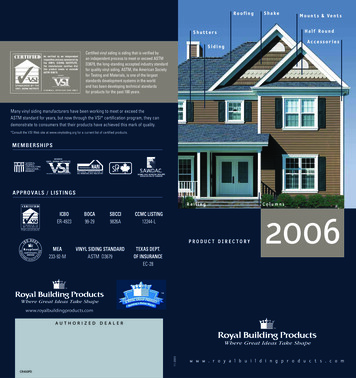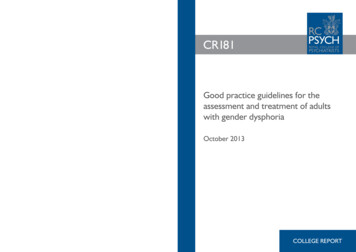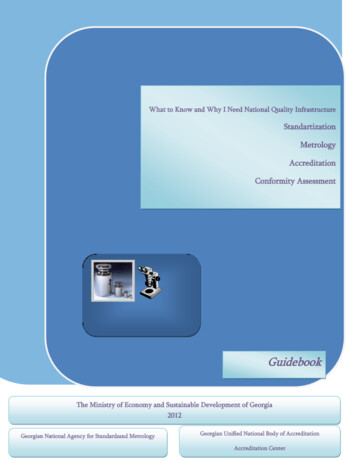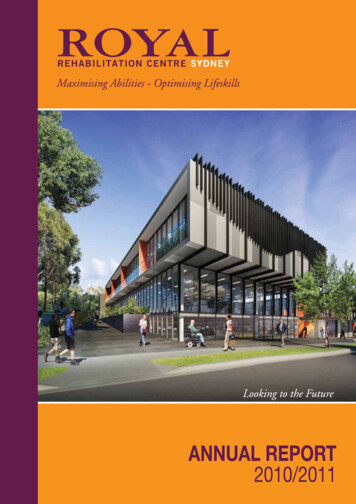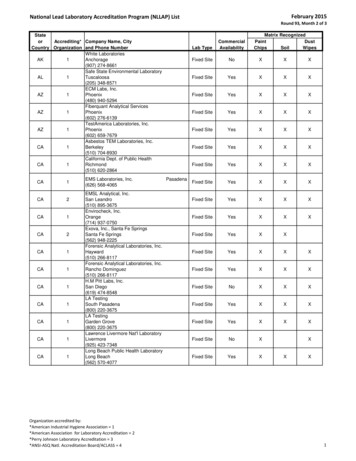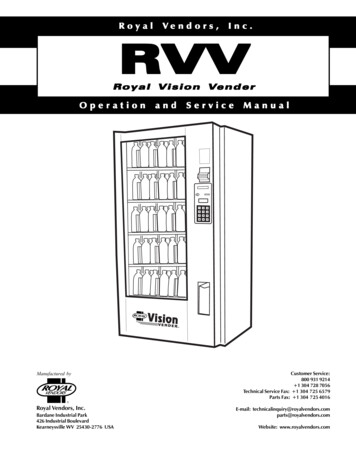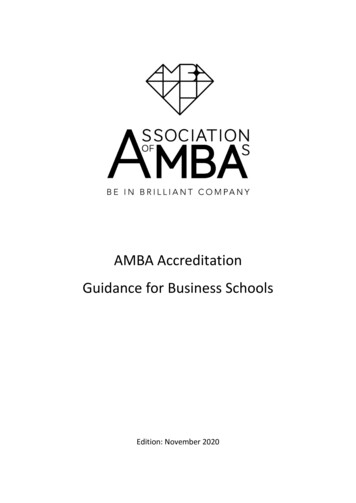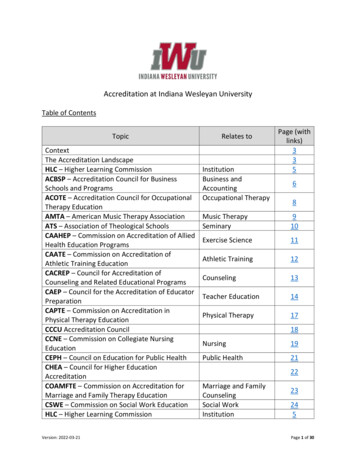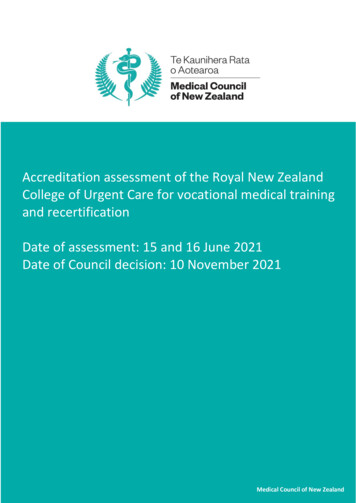
Transcription
Accreditation assessment of the Royal New ZealandCollege of Urgent Care for vocational medical trainingand recertificationDate of assessment: 15 and 16 June 2021Date of Council decision: 10 November 2021Medical Council of New Zealand 1
ContentsGeneral Information . 4Programme information . 4Executive Summary . 5Overall outcome of the accreditation assessment . 8Accreditation standards . 101The context of training and education . 102The outcomes of vocational medical training . 153The vocational medical training and education framework . 174Teaching and learning . 215Assessment of learning . 236Monitoring and evaluation. 287Trainees . 318Implementing the programme: delivery of education and accreditation of training sites . 359Recertification programmes, further training and remediation . 4010Assessment of international medical graduates for the purpose of vocational registration . 43Appendix 1 –Membership of the 2021 accreditation team . 45Appendix 2 –The Royal New Zealand College of Urgent Care key staff . 46Appendix 3 –List of submissions on the RNZCUC . 47Appendix 4 –Summary of the 2021 assessment programme. 482
BackgroundIt is the Medical Council of New Zealand’s (MCNZ) statutory role to monitor and promote medicaleducation and training in New Zealand. To ensure that its standards for New Zealand-based vocational andprevocational training providers are met, the MCNZ accredits training and recertification providers andtheir training programme(s).The purpose of the accreditation process is to recognise vocational medical training and recertificationprogrammes and their associated training providers that produce medical practitioners who: can practise unsupervised in the relevant vocational scope can provide comprehensive, safe and high-quality medical care that meets the needs of the NewZealand healthcare system are prepared to assess and maintain their competence and performance through recertificationprogrammes, maintaining their skills and developing new skills.The MCNZ accreditation process involves both accreditation (validating that standards are met) and peerreview to promote high standards of medical education, stimulate self-analysis and assist the trainingprovider to achieve its objectives. Accreditation is conducted in a collegial manner that includesconsultation, advice and feedback to the training provider.The MCNZ’s accreditation of vocational medical training and recertification programmes and theirassociated training providers is intended to:a.provide an incentive for the organisation being accredited to review and to assess its ownprogramme. The collegiate nature of accreditation should facilitate discussion and interaction withcolleagues from other disciplines to benefit from their experienceb.respect the autonomy of the training provider, and acknowledge the expertise in, and achievementsof, the training provider and its programmec.support and foster educational initiativesd.assist the training provider by drawing attention in the accreditation report both to weaknesses ofthe organisation’s education, training and professional development programmes and its strengthse.as a quality assurance mechanism, benefit prospective trainees, employers of the graduates ofprogrammes and the New Zealand public by ensuring a highly skilled medical workforce.The Royal New Zealand College of Urgent Care was assessed against the MCNZ’s 2020 Accreditationstandards for New Zealand training providers of vocational medical training and recertificationprogrammes.3
The Medical Council of New Zealand’s accreditationof the Royal New Zealand College of Urgent Care forvocational medical trainingGeneral InformationName of training provider:The Royal New Zealand College of Urgent CareAccreditation assessment:Accreditation assessment decision:Accreditation period granted:15 and 16 June 202110 November 2021December 2025Date of last accreditation decision:December 2017Programme informationScope:Urgent care medicinePost fellowship awarded:FRNZCUCTraining programmes offered:Urgent care vocational training programmeFellowship and membership categories:Membership:Number:403Honorary Fellows:2Trainee membership:172Fellowship:2294
Executive SummaryThe Medical Council of New Zealand has assessed the Royal New Zealand College of Urgent Care (RNZCUCor the College) and its training and recertification programme against MCNZ’s 2020 accreditationstandards. MCNZ has decided that overall the RNZCUC has substantially met the accreditation standards.The MCNZ accreditation team is grateful to the fellows, trainees and staff of the RNZCUC for their thoroughpreparation ahead of the accreditation process and for their willing engagement with the team throughoutthe visit.What is now the Royal College of Urgent Care (RNZCUC) was first formed in 1992 by doctors working incommunity clinics and hospital emergency departments. The primary aim was training of medicalpractitioners and a certificate course in Urgent Care was developed in 1994 in conjunction with theUniversity of Auckland. This course achieved Diploma status in 1995. That year RNZCUC became anincorporated society, the Accident and Medical Practitioners Association (AMPA). By the mid-1990s, therewere around 20 Urgent Care Centres in Auckland, and others were beginning to appear in other cities andlarge towns.The MCNZ recognised AMPA as a branch of medicine in 2001, with the Diploma a compulsory componentof training. In 2009 AMPA substantially revised and expanded the Urgent Care Course content and in 2011,the MCNZ approved AMPA’s new training programme, in which the Urgent Care Course was nowcompulsory, along with three of eight diploma papers. At this time AMPA changed its name to the Collegeof Urgent Care Physicians Incorporated and the doctor's designation to Urgent Care Physician. In 2013, theCollege attained royal recognition becoming the Royal New Zealand College of Urgent Care, and MCNZapproved the gazetted Branch name change to Urgent Care. Currently, Urgent Care is a recognisedvocational scope of practice in New Zealand only. Urgent care is positioned between and overlaps withgeneral practice and emergency medicine with respect to content and many Urgent Care doctors holdFellowships with one of these colleges.The RNZCUC was most recently accredited by the MCNZ as a vocational training provider in 2017. Since thattime RNZCUC has experienced significant growth. This is therefore an appropriate time for the College tostrengthen and formalise many of the structures around the vocational training programme. This includes areview of the governance structures that could be strengthened by increasing the level of collaborationwith external organisations and the community.The MCNZ is concerned that Urgent Care’s current structure does not provide for engagement across allrelevant stakeholder groups and this is an area that must be strengthened. It is important that the Collegeplace particular emphasis on increased collaboration and engagement with Māori, consumer groups andother medical education providers. This was particularly evidenced by the recent curriculum review whichcould have been strengthened with a greater level of stakeholder engagement. In addition, the Collegemust consider integrating what appear to be disparate elements of training so it better achieves thedesignated programme outcomes. The current RNZCUC training programme would be enhanced by agreater level of structure.The programme outcomes have been clearly articulated by senior staff, but these must be encapsulated inthe programme documentation. In addition, while there is clear evidence of purposeful curriculum designthis must be strengthened in terms of vertical integration. To do this the College will need to undertakepurposeful engagement with medical schools and prevocational training providers to achieve the mosteffective design.5
RNZCUC is to be commended for the recent appointments that have strengthened the organisation’s levelof educational expertise. Of concern is that RNZCUC does not appear to have any substantive relationshipswith consumer or public advocacy groups. Given that RNZCUC is the second largest provider for training incommunity-based care, this is an area that must be improved. The excellent collaboration with theUniversity of Auckland in the joint development of the Urgent Care course is commended. It is nowimportant that the College consider opportunities to collaborate with key stakeholders across the entiretraining programme.The College is to be commended for the flexibility built into the training programme that allows trainees tocomplete the programme in a wide range of time frames and clinical settings. However, this flexibility doesnot extend to encouraging, supporting or compelling the trainees to approach the breadth of thecurriculum as defined by the programme outcomes. Furthermore, there is no system in place whichenables progressive judgements to be made about trainee progression on clinical practice. Although thereare six meetings with supervisors over the course of the year, these are not documented to ensure asystematic approach to providing feedback to each trainee. Supervisors complete written feedback at theend of each year, but this needs to be enhanced with additional formal assessment and feedback to informthe trainee’s ongoing learning. Furthermore, Urgent Care trainees do not have access to their completerecord of learning.It is important that the College review and augment its suite of workplace-based assessments, and thatboth trainees and their supervisors have ready and reliable access to a record of training progress toencourage teaching and learning across the full curriculum.The specific needs of individual trainees do not appear to be linked to the educational capabilities of thevarious training sites. Furthermore, Urgent Care does not appear to match the needs of an individualtrainee with an appropriate supervisor. While the challenges of balancing the flexibility of its trainingprogramme are acknowledged, Urgent Care must ensure that the programme meets the needs of itstrainees. The failure to provide a standardised suite of assessment tools also leads to lack of consistencyand comparability across the training sites. This is particularly apparent with collecting supervisor feedbackand the largely informal basis of supervisor training. The RNZCUC has recognised opportunities tostrengthen the process of supervisor training, however, scope for this work may need to be broadened.Urgent Care is supportive of trainees who are in difficulty. However, there are no systems in place tocollaborate with employers if there are trainee performance concerns that may impact on patient safety.While the challenges in the employer/supervisory model are acknowledged, Urgent Care is strongly urgedto investigate mechanisms to improve this.Urgent Care is to be commended on the formation of the Registrar Subcommittee and ongoingpersonalised assistance from the College administration, which is greatly valued by the trainees.6
Summary of findings:Overall, the Royal New Zealand College of Urgent Care has met 26 of the 35 sets of Council’s Accreditationstandards for New Zealand training providers of vocational medical training and recertificationprogrammes. Six sets of standards were substantially met: Standard 2.1 – Educational Purpose. Standard 2.2 – Programme outcomes. Standard 3.3 – Continuum of training, education and practice. Standard 5.1 – Assessment approach. Standard 6.1 – Monitoring. Standard 8.1 – Supervisory and educational roles.Three sets of standards were not met: Standard 5.3 – Performance feedback. Standard 6.2 – Evaluation. Standard 8.2 – Training sites and posts.Thirteen required actions were identified, along with 18 recommendations and seven commendations. Therequired actions are:1.The RNZCUC must devise a more robust process for consultation with external stakeholders,including consumers, Māori and Pasifika, and closely associated medical colleges, to assist withsubstantive changes to its vocational training programme. (2.1.3)2.The RNZCUC must better define and clearly communicate its programme outcomes. (2.2.1)3.The RNZCUC must develop and implement a comprehensive engagement strategy, to ensure it seeksand receives external input into the curriculum design. This must include medical schools, othervocational training providers, prevocational medical training providers and employers. (3.3.1)4.The RNZCUC must strengthen its model of supervision, to ensure each trainee meets with theirsupervisor and receives feedback that is documented in a formal written supervision report on aregular basis that enables progressive judgements to be made about each trainee’s preparedness forthe vocational scope of urgent care. (5.1.1)5.The RNZCUC must formalise and increase the frequency and requirement for workplace-basedassessments, ensuring each trainee receives documented feedback and progressive judgements, inorder to provide assurance of teaching and learning across the breadth of the curriculum and theachievement of the outcomes of the training programme. (5.1.2)6.The RNZCUC must put in place a system to record and maintain a complete record of learning foreach trainee, with access for all trainees and supervisors to facilitate transparency, clarity andreliability of information about progress in the training programme. (5.3.1)7.The RNZCUC must ensure there are clear policies and procedures in place to inform employers wherepatient safety concerns arise related to a trainee. (5.3.4)8.The College must ensure it improves supervisors’ ability to contribute to programme developmentand monitoring of the training and education programme by standardising supervisor feedbackassessment tools. (6.1.2)9.The RNZCUC must formulate and publish its programme outcomes and then develop clear standardsto evaluate these outcomes. (6.2.1)10. The RNZCUC must ensure there is an effective system of clinical supervision to support trainees toachieve the programme and graduate outcomes. (8.1.1)11. The RNZCUC must record a list of approved supervisors and effectively monitor supervisor training.(8.1.3)12. The RNZCUC must take the lead in matching training needs to training sites. (8.2.2)13. The RNZCUC must ensure that trainees have supervisors that are appropriate for their training needs.(8.2.2)7
Overall outcome of the accreditation assessmentThe overall rating for the accreditation of the Royal New Zealand College of Urgent Careas a training provider for vocational medical training and recertificationSubstantiallyMetMCNZ considered and approved the report titled the Accreditation assessment of the Royal New ZealandCollege of Urgent Care for vocational medical training and recertification and determined that:a.the overall outcome of the accreditation assessment of the Royal New Zealand College of UrgentCare is ‘substantially met’, andb.the Royal New Zealand College of Urgent Care is accredited for a period of 4 years, until 30November 2025, subject to the Royal New Zealand College of Urgent Care meeting the requiredactions on its accreditation, andc.the Royal New Zealand College of Urgent Care is to provide annual reports to Council for theperiod of its accreditation.MCNZ has requested that the Royal New Zealand College of Urgent Care provide an annual and progressreport that satisfies MCNZ that the following required actions have been addressed by the dates below:Council resolves that the Royal New Zealand College of Urgent Care is advised that it must provideprogress reports that satisfies Council that the following required actions have been addressed by thedates below:By 30 November 20221.The RNZCUC must devise a more robust process for consultation with external stakeholders,including consumers, Māori and Pasifika, and closely associated medical colleges, to assist withsubstantive changes to its vocational training programme. (2.1.3)2.The RNZCUC must better define and clearly communicate its programme outcomes. (2.2.1)3.The RNZCUC must develop and implement a comprehensive engagement strategy, to ensure itseeks and receives external input into the curriculum design. This must include medical schools,other vocational training providers, prevocational medical training providers and employers.(3.3.1)6.The RNZCUC must put in place a system to record and maintain a complete record of learning foreach trainee, with access for all trainees and supervisors to facilitate transparency, clarity andreliability of information about progress in the training programme. (5.3.1)7.The RNZCUC must ensure there are clear policies and procedures in place to inform employerswhere patient safety concerns arise related to a trainee. (5.3.4)9.The RNZCUC must formulate and publish its programme outcomes and then develop clearstandards to evaluate these outcomes. (6.2.1)11. The RNZCUC must record a list of approved supervisors and effectively monitor supervisor training.(8.1.3)By 30 November 20234.The RNZCUC must strengthen its model of supervision, to ensure each trainee meets with theirsupervisor and receives feedback that is documented in a formal written supervision report on aregular basis that enables progressive judgements to be made about each trainee’s preparednessfor the vocational scope of urgent care. (5.1.1)5.The RNZCUC must formalise and increase the frequency and requirement for workplace-basedassessments, ensuring each trainee receives documented feedback and progressive judgements, inorder to provide assurance of teaching and learning across the breadth of the curriculum and theachievement of the outcomes of the training programme. (5.1.2)12. The RNZCUC must take the lead in matching training needs to training sites. (8.2.2)13. The RNZCUC must ensure that trainees have supervisors that are appropriate for their trainingneeds. (8.2.2)8
30 November 20248.The RNZCUC must ensure it improves supervisors’ ability to contribute to programmedevelopment and monitoring of the training and education programme by standardisingsupervisor feedback assessment tools. (6.1.2)10. The RNZCUC must ensure there is an effective system of clinical supervision to support trainees toachieve the programme and graduate outcomes. (8.1.1)9
Accreditation standards11.1The context of training and educationGovernance1.1.1The vocational medical training provider’s (training provider’s) corporate governance structuresare appropriate for the delivery of vocational medical specialist programmes, recertificationprogrammes and the assessment of international medical graduates (IMGs).1.1.2The training provider has structures and procedures for oversight of training and educationfunctions which are understood by those delivering these functions. The governance structuresshould encompass the provider’s relationships with internal units and external trainingproviders where relevant.1.1.3The training provider’s governance structures set out the composition, terms of reference,delegations and reporting relationships of each entity that contributes to governance, and allowall relevant groups to be represented in decision-making.1.1.4The training provider’s governance structures give appropriate priority to its educational rolerelative to other activities, and this role is defined in relation to its corporate governance.1.1.5The training provider collaborates with relevant groups on key issues relating to its purpose,training and education functions, and educational governance.1.1.6The training provider has developed and follows procedures for identifying, managing andrecording conflicts of interest in its training and education functions, governance and decisionmaking.1.1GovernanceMetSubstantially metNot metRatingXSummary of findings:The College’s governance structure is based around an elected Executive Committee that comprisesFellows of the College and registrars in training. This Committee includes representation from EmergencyDepartment staff, Māori and community representatives. The College’s Education Committee isresponsible for the implementation and evaluation of the vocational training programme. It is apparentthat while the governance structure includes representatives from various groups this representation isnot formalised with well-defined memoranda of understanding and to some extent the representationmay be interpreted as passive and ad-hoc.It is therefore of considerable importance that the College formalise the relationships with the variousstakeholder representatives to the extent that there are clearly defined roles and expectations. This willhelp more clearly define the roles, responsibilities and expectations of all those contributing to the actualteaching component of the programme. This can be achieved through well-developed memoranda ofunderstanding and with the expectation that all stakeholders will be appropriately represented.The Governance Policy outlines the composition, terms of reference, delegations and reportingrequirements for the Executive Committee and the standing Committees.Appropriate priority is given to the College’s educational role. The Director of Clinical Training isresponsible for the effective implementation and delivery of the training programme and providessupport to the Board of Censors. The College’s recertification programme comes under the direction ofthe Director of Professional Development who oversees the performance of Fellows and manages thoseFellows who are underperforming.The College has a Conflict of Interest Policy which covers declaring, recording, identifying, and10
managing conflicts of interest across all aspects of the College.Required actions:Nil.1.2Programme management1.2.1The training provider has structures with the responsibility, authority and capacity to direct thefollowing key functions: planning, implementing and evaluating the vocational medical programme(s) andcurriculum, and setting relevant policy and procedures setting and implementing policy on its recertification programme(s) and evaluating theeffectiveness of recertification activities setting, implementing and evaluating policy and procedures relating to the assessment ofIMGs certifying successful completion of the training and education programmes reporting on the six-factor framework on the viability of the vocational training provideras part of its accreditation process.1.2Programme managementMetSubstantially metNot metRatingXSummary of findings:At present, the College has appropriate structures that provide the responsibility and authority to directthe key functions of the training programme with an Executive Committee that has overall control of thevocational training and recertification aspects of the programmes. This Committee has responsibility forsetting policy and implementing regulations being shared between the Board of Censors, the EducationCommittee and the Professional Standards Committee. With the recent growth within the College it isimportant that appropriate steps are taken to ensure adequate capacity for these committees toeffectively carry out their functions. This includes support for executive, administrative and teachingstaff.The College review of the curriculum has been particularly informative but could have been greatlyenhanced by the inclusion of appropriate external medical education expertise. This would not only haveprovided added capability but also have provided the opportunity for further, and extremely important,relationship building with other medical education providers such as the Universities of Auckland andOtago who have a wealth of medical education experience.RNZCUC should consider integrating the various elements of the training programme so that it moreeffectively achieves the programme outcomes. At present, the elements appear disparate and this canprevent a graduate from obtaining an otherwise broad and purposeful scope in Urgent Care. The trainingprogramme requires greater structure and cohesion, not just within the curriculum but also with theelements of supervision and assessment.Irrespective of this, the College are to be commended on the flexibility within the programme but needto be cautious of increasing flexibility leading to greater risk in not being able to achieve the programmeoutcomes.Commendation: The College are to be commended on the flexibility within the programme, in particular enablingtrainees to complete the programme at a pace specific to their individual circumstances. (1.2.1)Required actions:Nil.11
1.3Reconsideration, review and appeals processes1.3.1The training provider has reconsideration, review and appeals processes that provide forimpartial review of decisions related to training and education functions. It makes informationabout these processes publicly available.1.3.2The training provider has a process for evaluating de-identified appeals and complaints todetermine if there is a systems problem.1.3Reconsideration, review and appeals processesMetSubstantially metNot metRatingXSummary of findings:The College has an appropriate reconsideration, review and appeals process, which allows for impartialreview of decisions across all College activities. The Executive Committee is responsible for thedevelopment and implementation of its Appeals Policy, and reviews occur as required and at least everyfour years. The policy is publicly available on the College’s website. Doctors who are unsuccessful in theirapplication to join the training programme or who fail an assessment are advised of their right to appeal.Committees report annually to the Executive Committee on reconsiderations and internal reviews,including an anonymised summary of each case, outcomes, and any recommended changes to policies orprocesses. The Executive Committee considers these reports to determine if there are any systemicproblems. RNZCUC acknowledges the conflict of interest and confidentiality challenges inherent in asmall College but believe these are properly managed through appropriate processes.The College has an appropriate process for evaluating de-identified appeals and complaints to determineif there is a systems problem.Required actions:Nil.1.4Educational expertise and exchange1.4.1The training provider uses educational expertise in the development, management andcontinuous improvement of its training and education functions.1.4.2The training provider collaborates with other educational institutions and compares itscurriculum, vocational medical training programme and assessment with that of other relevantprogrammes.1.4Educational expertise and exchangeMetSubstantially metNot metRatingXSummary of findings:The College has recently appointed a new convenor to its Education Committee. The convenor has a highlevel of appropriate medical education expertise with a primary appointment to the Faculty of Medicaland Health Sciences at the University of Auckland. The College are to be commended on thisappointment and the appointment of other senior medically qualified staff to the teaching programme.The College is a member of the Council of Medical Colleges which provides a forum for collaboration andsharing with a number of New Zealand and Australasian colleges.The College is encouraged to continue its collaboration with the Faculty of Medical and Health Sciencesat the University of Auckland and consider whether this collaboration should be extended across otheraspects of its training programme.12
Commendation: The College is to be commended for the staff appointments made to strengthen the level ofeducational expertise. (1.4.1)Required actions:Nil.1.5Educational resources1.5.1The training provider has the resources and management capacity to sustain and, whereappropriate, deliver its training and education functions.The training provider’s training and education functions are supported by sufficientadministrative and technical staff.1.5.21.5Educational resourcesMetSubstantially metNot metRatingXSummary of findings:The College has appropriate information systems with a website that hosts the Core Skills list, details oftraining and recertification programmes, the curriculum and a booking system for training events.Resources include various webinars, podcasts and core skills videos. Annual continuing professionaldevelopmen
Name of training provider: The Royal New Zealand College of Urgent Care Accreditation assessment: 15 and 16 June 2021 Accreditation assessment decision: 10 November 2021 Accreditation period granted: December 2025 Date of last accreditation decision: December 2017 Programme information Scope: Urgent care medicine Post fellowship awarded: FRNZCUC


